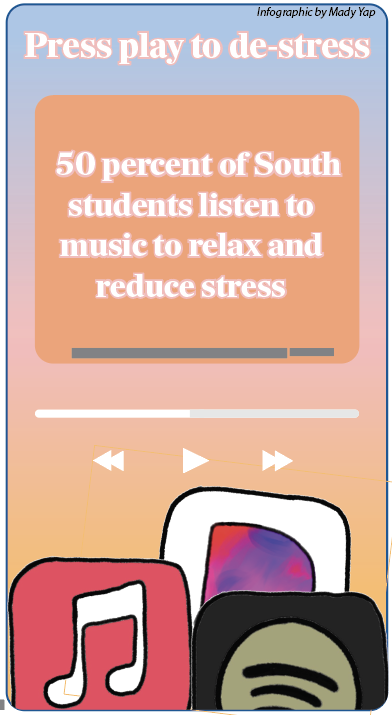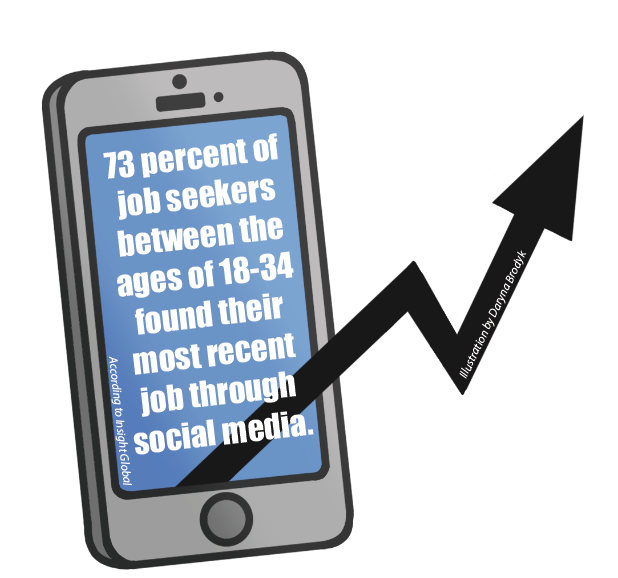Looking down the halls of South, it’s often hard to find a time when there isn’t someone with an iPhone out, listening to tunes or getting in their hourly Twitter fix. In the cafeteria, it’s more common to interact with friends by posting a comment on Facebook than to strike up a conversation at the lunch table. A new type of technology has flooded the teen population, and it’s called the smartphone.
According to a recent Oracle-conducted survey of 231 students, 74 percent of South students have a smartphone. But, though smartphones are certainly popular among teens, they seem to suffer from misuse.
Let me be clear, I’m not questioning the use of the basic cell phone. Considering the number of messages I send, I’m in no position to criticize texting. The real problem is the miniature computers that people carry in their pockets.
I’m not gonna lie, I love my iPhone. The games and apps stave off boredom when I’m waiting for the bus, and it’s great to be able to check email any time of the day. But, without my smartphone, would my life be greatly affected? Probably not.
This is because a basic problem with smartphones is that they’re often underused, especially among us teens. According to the same Oracle-conducted survey, 40 percent of South students primarily use their smartphones for games and apps, which is fun, but not really fulfilling the potential of this remarkable technology. We have the answers of the world literally at our fingertips, and instead we send selfies to our friends.
I’ll admit that I’m not much different; most of what I use my smartphone for falls into the “unnecessary” category. But, although I don’t even use my smartphone to its full potential, I use it often enough to notice its absence.
Whenever I have a few free minutes, the first thing I do is pull out my phone. I scroll aimlessly through my Facebook newsfeed, troll Instagram or check my email. There are very few times when I’m bored as long as I’ve got my iPhone by my side, but I often have to ask myself why I took out my phone in the first place.
The more that I use my phone, the more I have the urge to use it. Whether it’s in the middle of class during a lecture, sitting on the bus on the way home, or even listening to a never-ending story from a friend, it has become a strong habit. Whenever I’m not stimulated, I think of my iPhone in my backpack pocket and its promise of instant entertainment.
Instead of striking up a conversation with friends in the cafeteria, I turn to Instagram. But smartphones can have harmful effects beyond stealing focus from social settings.
Ever had problems falling asleep at night? Your smartphone may play a role in your insomnia if you’re up late texting or playing games. According to abc2news.com, the bright light from computer technologies disrupts the production of the hormone melatonin that induces sleep. Being free of technology an hour before bed may help.
Smartphones have become such a constant part of our day that even an hour without them can feel strange. According to The Daily Beast, teens spend over seven hours a day in front of screens. This is made easier by the fact that our screens are so mobile. My laptop is all the way across my room on my desk, but with my iPhone sitting patiently on my bedside table, I have a technological connection from the moment I wake up to the moment I go to sleep.
It’s no wonder that our brains are adapting to the technological deluge from this constant, impulsive connection. According to The Daily Beast, scientists in China connected internet addiction to a 10 percent to 20 percent shrinkage of the part of the brain that controls speech, memory, motor skills, emotion, and more. And according to howtolearn.com, the nature of a smartphone to quickly switch from one topic to another shortens attention span and the ability to focus on one topic for extended lengths of time.
In fact, connections have been found between excess use of technology and disorders involving concentration. According to everydayhealth.com, diagnoses of ADHD have increased over 30 percent from 1997 to 2006, and some believe this rise may be caused by the amount of time kids spend staring at screens.
Even knowing all this, I still find it hard to keep my phone at arm’s length for too long. According to WebMD, this may be because computer technologies like smartphones are psychoactive, which means they can alter mood and create enjoyable feelings, leading to a kind of addiction. Email and Facebook, for example, can be addictive because we don’t know when we’ll get a new email or notification, so we keep checking, seeking that good feeling.
An average user might even check their smartphone around 35 times a day, according to WebMD. Though there’s no strong research about actual smartphone addiction yet, being this connected to technology can lead to a disconnect from daily life, and sometimes too great a disconnect. Ever spent more time on a night out with friends tweeting or posting about the evening than actually enjoying it?
Don’t get me wrong—smartphones certainly have good sides too. For someone constantly on the go, having a mobile way to finish up work can be very helpful. Or, if you get lost while wandering around with friends, a map app can come in handy. Plus, there’s plenty of great news apps available to keep you up-to-date. Unfortunately, in many cases, it seems that smartphones are used past the point of helpfulness.
Growing up in a world that devours every new technology on the market, our generation will always have to tiptoe the line between usefulness and excess. And in the end, it’s up to us to decide if our smartphones, as with other technological advances of the future, will be more helpful or hurtful. For now, though, it might do us all some good to turn off our phones for a while and get back to reality.













